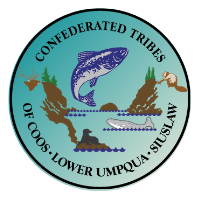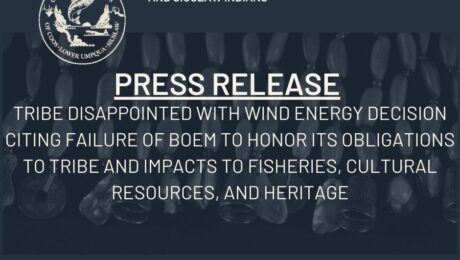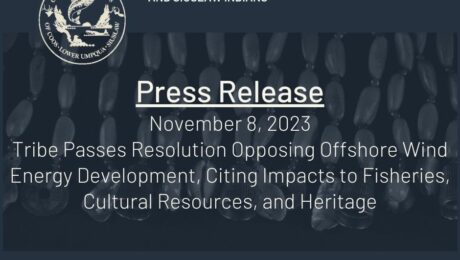TRIBE DISAPPOINTED WITH WIND ENERGY DECISION CITING FAILURE OF BOEM TO HONOR ITS OBLIGATIONS TO TRIBE AND IMPACTS TO FISHERIES, CULTURAL RESOURCES, AND HERITAGE
February 13, 2024
For Immediate Release
COOS BAY, OREGON – The Confederated Tribes of the Coos, Lower Umpqua, and Siuslaw Indians (“Tribe”) are extremely disappointed in today’s decision by the Bureau of Ocean Energy Management (“BOEM”) to finalize the Wind Energy Areas for offshore wind development in Oregon. Today’s decision authorizes approximately 195,012 acres for wind energy development, in areas that are within the Tribe’s ancestral territory, contain viewsheds of significant cultural and historic significance to the Tribe, and are important areas for Tribal fishing.
“Despite a federal obligation to consult on a government-to-government, the Tribe learned yesterday of BOEM’s impending decision from officials with the Oregon Governor’s office,” said Tribal Council Chair Brad Kneaper. “BOEM had the courtesy to communicate its decision to the State well ahead of its public release and waited until the eleventh hour to send the Tribe an email about its decision. This illustrates well the failure of BOEM to meet its obligations to consult with the Tribe and to meaningfully consider its concerns. We would have at least expected a phone call from BOEM. We appreciate the Governor and her staff in reaching out to us.”
“BOEM’s press release states that it has ‘engaged’ with the Tribe, but that engagement has amounted to listening to the Tribe’s concerns and ignoring them and providing promises that they may be dealt with at some later stage of the process,” said Chair Kneaper. “BOEM has failed to recognize that wind development has impacted the Tribe and has failed to assure that wind energy development will do good and not harm the Tribe, its members, and the greater coastal community. The Tribe will not stand by while a project is developed that causes it more harm than good – this is simply green colonialism.”
In November 2023, the Tribal Council unanimously passed a resolution expressing its opposition to offshore wind energy development off the Oregon Coast. In multiple communications with BOEM, including comments submitted in November, the Tribe has consistently raised concerns about wind energy development. These comments include a request that important, cultural viewsheds be excluded from the WEAs and that wind development avoid areas critical to resident and migratory species, including important areas for fishing.
The Tribe’s concerns echo the concerns of other local governments, including Lane County and Coos County, which has expressed opposition to wind energy development, and resolutions of regional and national tribal organizations, including the National Congress of American Indians, which has called for a halt to the approval process until BOEM develops a process to consider Tribal impacts.
“The Tribe consistently asked BOEM to exclude important fishing areas from wind energy development. Fishing is an important industry on the Coast that employs tribal members and supports tribal businesses. Fish, including salmon, are also an important cultural and subsistence resource to the Tribe. Any impact on fish from wind development is going to harm our local jobs and the Tribe,” said Chair Kneaper. “We also have serious concerns for the environmental impacts that may occur as a result of this development. We simply don’t know yet how extensive those impacts may be. Today’s decision ignores these concerns.”
“The Tribe has called the Coast our home since Time Immemorial,” said Tribal Chief Doug Barrett. “The unique landscape, places of religious significance, viewsheds and traditional resources of our Ocean, bays, upland dunes, forests, archaeological features, cultural resources, and first foods connect us to our tribal ancestors. Our homelands and oceans have been the foundation of our way of life since time immemorial and remain a cornerstone of our Tribe to this day. As a confederation of coastal tribes deeply dependent on the Ocean and its rich resources, we assert a direct interest in the viewshed extending from our shores, encompassing a distance of at least twelve nautical miles beyond the continental shelf. We believe it is our inherent right to have the ability to see across our viewsheds, as this direct connection is integral to our cultural practices and traditional way of life. This connection empowers us to protect and conserve our cultural resources for the prosperity of our future generations. Our religious beliefs, traditional
practices, fishing, first foods, and relations are interconnected and influenced by all that is encompassed in the broader Ocean. We are and have been stewards of our ocean and our ecosystems forever! BOEM’s decision today ignores the important cultural concerns consistently expressed by the Tribe, including impacts to our culturally significant viewsheds. We don’t want these places marred by development.”
In an October 31, 2023 letter to BOEM, the Tribe called upon BOEM to halt its process to allow for consideration of impacts of wind energy, including consideration of a congressionally mandated National Academy of Science study on wind energy impacts to fisheries on the West Coast.
“BOEM is proceeding without seriously considering or understanding the impacts of wind energy development,” said Chair Kneaper. “The Tribe will explore all options to ensure that its concerns are addressed in this process.”
- Published in Public Notices, Tribal Event, Tribal News
TRIBE PASSES RESOLUTION OPPOSING OFFSHORE WIND ENERGY DEVELOPMENT, CITING IMPACTS TO FISHERIES, CULTURAL RESOURCES, AND HERITAGE
November 8, 2023, COOS BAY, OREGON – The Tribal Council of the Confederated Tribes of the Coos, Lower Umpqua and Siuslaw Indians (“Tribe”) unanimously passed a resolution expressing its opposition to offshore wind energy development off the Oregon Coast. The resolution corresponds with the deadline for comments on the federal Bureau of Ocean Energy Management (“BOEM”) two draft Wind Energy Areas (“WEAs”) for development of wind energy in areas near Florence and Brookings.
“After meetings with the Director of BOEM, it was apparent to the Tribe that its concerns regarding offshore wind development’s impacts to fisheries and cultural resources were not going to be addressed in a meaningful way,” said Tribal Council Chair Brad Kneaper. “The Tribe has not taken a position for offshore wind, but rather, we are at the table to learn about the impacts. We recognize that all energy development has impacts and BOEM has failed to provide assurance that wind energy development will do good and not harm the Tribe, its members, and the greater coastal community.”
In multiple communications with BOEM, including comments submitted this week on the WEAs, the Tribe has consistently raised concerns about wind energy development. These comments include a request that important, cultural viewsheds be excluded from the WEAs and that wind development avoid areas critical to resident and migratory species, including important areas for fishing.
“The Tribe also has consistently asked BOEM to exclude important fishing areas from wind energy development. Fishing is an important industry on the Coast that employs tribal members and supports tribal businesses. Fish, including salmon, are also an important cultural and subsistence resource to the Tribe. Any impact to fish from wind development is going to harm our local jobs and the Tribe,” said Chair Kneaper.
“Standards for green infrastructure should not be less than other energy development,” said Vice Chair Doug Barret. “Green infrastructure must not trump the federal government’s obligations to protect tribal resources. That is simply green colonialism. Because an energy is renewable is not justification enough to rush a process, to ignore or minimize adverse impacts to our community, environment, or cultural resources.”
“The Tribe remains open to working with the BOEM to resolve the issues raised in our comments,” said Chair Kneaper. “We plan to provide comments to BOEM on the WEAs, to provide testimony at the public hearings, and to coordinate with our local and state partners to address our concerns.”
“BOEM has demonstrated it is not serious about listening to the concerns of the Tribe or of our coastal communities,” said Chair Kneaper. “During a recent meeting, BOEM failed to follow through on a public testimony held in Coos Bay, and we repeatedly hear from our local government partners that BOEM has failed to connect or provide information about the impacts of wind energy development.”
The Tribe’s resolution echoes the concerns of other local governments, including Lane County and Coos County, which has expressed opposition to wind energy development, and resolutions of regional and national tribal organizations, including the National Congress of American Indians, which has called for a halt to the approval process until BOEM develops a process to consider Tribal impacts.
“This process is running roughshod over Tribal concerns, the concerns of commercial fishing, and local government. The Biden’s Administration of 30 gigawatts of wind energy by 2030, while an admirable goal, should not provide a blank check for BOEM to disregard the coastal resources that we hold dear,” said Chair Kneaper.
“The Tribe has called the Coast our home since Time Immemorial,” said Vice Chair Barrett. “The unique landscape, places of religious significance, viewsheds and traditional resources of our Ocean, bays, upland dunes, forests, archaeological features, cultural resources, and first foods connect us to our tribal ancestors. Our homelands and Ocean have been the foundation of our way of life since time immemorial and remains a cornerstone of our Tribe to this day. As a confederation of coastal tribes deeply dependent on the Ocean and its rich resources, we assert a direct interest in the viewshed extending from our shores, encompassing a distance of at least twelve nautical miles beyond the continental shelf. We believe it is our inherent right to have the ability to see across our viewsheds, as this direct connection is integral to our cultural practices and traditional way of life. This connection empowers us to protect and conserve our cultural resources for the prosperity of our future generations. Our religious beliefs, traditional practices, fishing, first foods and relations are interconnected and influenced by all that is encompassed in the broader Ocean.”
In its October 31, 2023 comments to BOEM, the Tribe called upon BOEM to halt its process to allow for consideration of impacts of wind energy, including consideration of a congressionally mandated National Academy of Science study on wind energy impacts to fisheries on the West Coast.
The Resolution passed by the Tribal Council makes it clear that the Tribe will take all necessary action to oppose BOEM’s actions or otherwise ensure that invaluable natural and cultural resources are protected.
A copy of the Resolution and October 31, 2023 comments to BOEM are included with this press release.
- Published in Public Notices, Tribal Event, Tribal News


